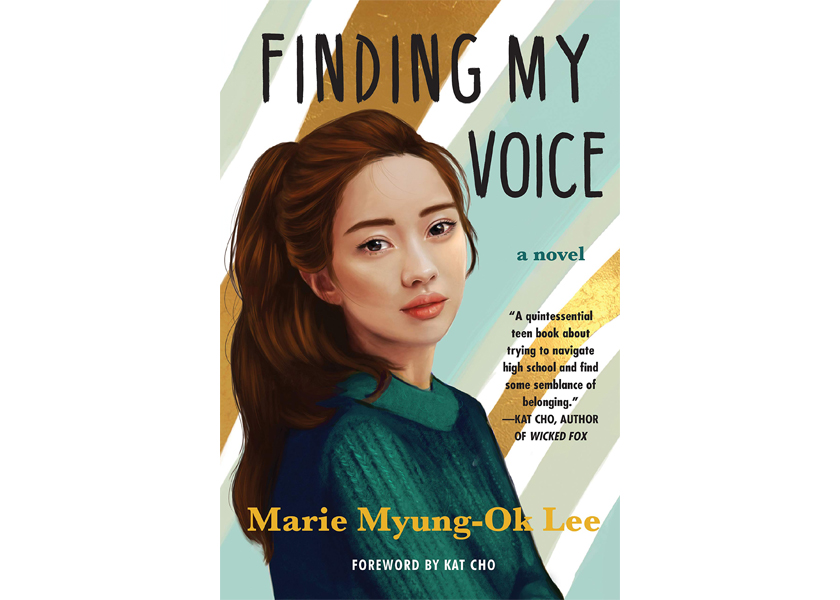Finding My Voice ~ By Marie Myong-Ok Lee
(Soho Press, New York, 2020, ISBN# 978-1-64129-197-2)
Review by Joanne Rhim Lee (Spring 2021 issue)

“Hey, chink, move over.”
This is how the main character in Marie Myong-Ok Lee’s young adult (YA) novel Finding My Voice is greeted on the bus on the first day of school, and is the first indication that Lee is not going to sugarcoat anything about the Asian American experience.
Finding My Voice was first published in 1993, and re-issued in a shiny new edition in 2020. Many of the issues Lee writes about – teenage crushes, sports competitions, and college admissions anxiety, will forever be on YA bookshelves. One would hope that the racial slurs and other examples of anti-Asian racism in the 1993 version would have “aged out,” but unfortunately those still apply as well.
Ellen Sung is a Korean American high school senior in a small town in northern Minnesota, a twin of the Minnesota town in which the author grew up. Her parents immigrated to the U.S. decades earlier, and then moved to Minnesota from California when her father, a doctor trained in Korea, got a job at the local hospital.
In addition to the normal teenage stressors, Ellen also faces enormous pressure from her parents. Her older sister Michelle attends Harvard, and Ellen is expected to follow in her footsteps. A normal dinnertime conversation consists of how her calculus class is going, and which colleges Ellen will apply to. Topics that are not covered are: why her parents never come to her gymnastics meets, or how it’s going with Tomper, the boy she is sort-of dating.
Even though she doesn’t always agree with or understand her parents and their rules, Ellen does her best to please them. She puts her head down and studies hard, which is not always easy when one has blatantly racist teachers. In her chemistry class, her teacher askes her if she is Chinese or Japanese. When she softly answers that she is Korean, he bellows, “Oho, you Koreans! You Koreans wok your dogs!” and explodes into laughter, while Ellen cringes inside.
Sports would seem like a good outlet to blow off steam, but Ellen faces problems on the gymnastics team as well. Marsha, the top gymnast and one of the most popular girls in school, calls her “Ching chong Chinaman” and “Ching ding-a-ling,” among other racist slurs.
Though Ellen may be a quiet girl, this is not the story about a silent victim of racism. Lee does not oversimplify this story by making it only about awful racists and their invisible targets; she also challenges her readers to examine the role of bystanders. When someone hisses “Chink!” as Ellen accepts her diploma at her high school graduation, she wonders if her friends or Tomper heard the slur. Are they pretending not to hear? Why did no one speak up for Ellen on the bus on the first day of school? Why does her gymnastic coach excuse the racist comments from her teammates, advising her to not take it so personally? What is the responsibility of bystanders?
Because of these incidents, Ellen feels extremely isolated in this overwhelmingly white community. Her sister is away at college, and her parents seem to be either unaware or immune to the racism. While snooping around in her father’s office, she finds an old newspaper article that sheds some light on her parents’ lives in Korea, and why he gave up a lucrative medical practice in California for a less glamorous job in a small Midwestern town.
As is so often the case in YA literature and in life, things are not always what they seem. As Ellen learns more about her parents, she also learns more about herself, and discovers she actually has an amazing amount of grit. She is far from the robotic, docile girl that everyone thinks she is. She may have been silent for the first 18 years of her life, but she won’t remain so any longer. Finding My Voice is a powerful story, for young and not-so-young adults, at any age and at any time.
See KQ’s “Author Interview” with Marie Lee that appeared in the Winter 2021 issue)


